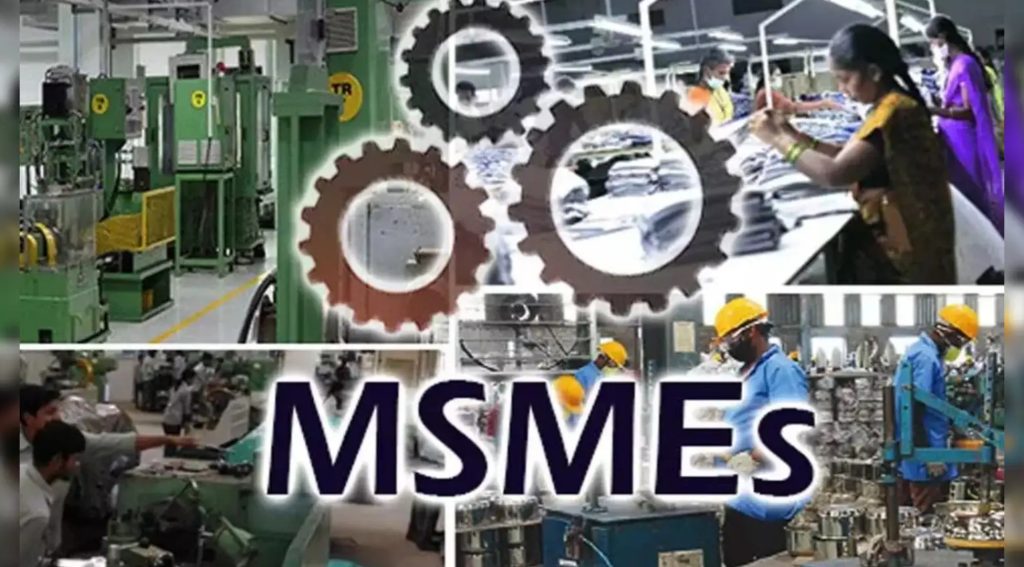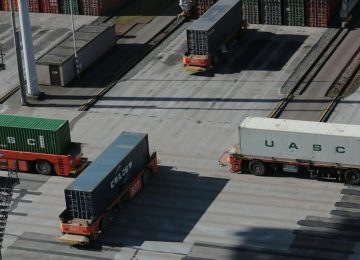The increasing focus on micro, small, and medium enterprises or MSMEs in the sustainability space is gaining significant momentum, largely driven by the growing responsibility on Scope 3 emission compliance.
India is transforming towards a green economy, with the MSMEs leading the way. These organizations are not just a recipient of green policies; they are key agents of change, shaping India’s environmental footprint and ensuring a Just Transition in the emerging economy.
The role of MSMEs in green finance and transition:
Indian MSMEs are the economic backbone, contributing to job generation, income generation, and poverty reduction, providing livelihoods to around 12 crore people.
As per the Ministry of Statistics and Program Implementation, the MSME sector continues to be a substantial contributor to India’s GDP and GVA, building on the 30.1% GVA share seen in FY 2022-23. While precise, final figures for FY 2024-25 for GDP/GVA are still provisional or pending official release, the trend indicates their sustained and critical role in the Indian economy. Their export contribution, exceeding 45% by May 2024, is a strong indicator of their ongoing economic impact.
The sector’s growth is inherently inclusive, ensuring equitable distribution of economic benefits across society, reducing regional disparities, and empowering marginalized groups through entrepreneurial opportunities. This vital role is now expanding to encompass environmental stewardship as well.
Green MSMEs, incorporating sustainable technologies and circular business models, are transforming the sector to further ensure equitable economic distribution, reduce regional disparities, and empower marginalized groups.
The growth and expansion of Green MSMEs significantly influence India’s ambitious climate goals, particularly its commitment to net-zero emissions by 2070. These enterprises directly support India’s commitment to the United Nations Sustainable Development Goals (SDGs), making significant contributions to targets such as SDG 1 (Poverty Alleviation), SDG 8 (Decent Work and Economic Growth), SDG 9 (Industry Innovation and Infrastructure), SDG 13 (Climate Action), SDG 14 (Life Below Water), and SDG 15 (Life on Land).
Indian MSMEs are increasingly recognizing the importance of green practices due to global sustainability demands and domestic environmental concerns, acting as agents of change for national environmental improvement. This embrace of sustainable initiatives by MSMEs is not just a trend; it’s a fundamental shift that is expected to significantly accelerate India’s overall sustainability goals and its ambitious journey towards net-zero emissions.
MSMEs: integral to green value-and-supply chains:
The importance of MSMEs in the green transition extends significantly to their crucial role within green value chains and supply chains.
Large corporations are embracing environmentally-friendly practices, sourcing raw materials and delivering products, driven by evolving ESG standards and growing consumer and investor demand for sustainable products. This creates an enormous opportunity for MSMEs that can adapt to these new demands. It’s also important to note that supply chain emissions often fall under the scope 3 responsibility of these larger entities, acting as a significant catalyst for this green transition among their MSME partners.
These smaller enterprises often act as suppliers of components, raw materials, or services to larger industries. As such, they become crucial links in the ESG performance of the entire chain. For example, a large automotive manufacturer cannot claim to be truly sustainable if its MSME suppliers use highly polluting processes.
This push for sustainability from the top-down means that MSMEs demonstrating strong environmental practices (E), ethical labor standards (S), and transparent operations (G) become preferred partners. This also provides an impetus for MSMEs to invest in energy efficiency, renewable energy adoption, sustainable waste management, and ethical sourcing to remain competitive and gain access to new supply contracts.
Opportunities:
The opportunity for green MSMEs is enormous, with demand for green products and services growing exponentially, driven by increasing consumer awareness, regulatory pressures, and ambitious corporate sustainability targets.
Indian MSMEs are well-positioned to capitalize on this by producing eco-friendly goods, offering sustainable services like waste recycling or renewable energy installation, or by greening their existing production processes to serve eco-conscious large buyers.
Around 40% of MSMEs in manufacturing and services sectors have confirmed initiatives like green energy transition by solar panel installation and e-vehicles, with many planning further green practices. India added 25 GW of renewable energy capacity in FY 2024-25, a 35% increase from the previous year. Projections suggest a $15 trillion green economy by 2047. This strong momentum underscores the vast and expanding market for MSMEs embracing sustainable practices.
Challenges:
Despite opportunities, Indian MSMEs face several significant challenges in accessing green finance and undertaking their green transition. Firstly, high upfront costs for adopting green technologies remain a primary barrier. Investing in energy-efficient machinery, solar panels, or advanced waste treatment systems often requires substantial capital outlay, coupled with tight operating margins that make immediate investment difficult for cash-strapped small businesses.
Beyond financial constraints, many MSMEs lack adequate awareness about available green financing options and, more critically, about the long-term financial and operational benefits of sustainable practices. This awareness-action gap means that even well-intentioned schemes often go underutilized.
Additionally, a scarcity of robust, standardized sustainability data from smaller enterprises makes it challenging for banks and financial institutions to assess their green credentials and the viability of their proposed green projects. Without reliable data on emissions, resource consumption, or social impact, it becomes difficult for lenders to evaluate risk and allocate green capital effectively.
Furthermore, the complexities of navigating application processes for green loans and a perceived lack of technical expertise to identify, implement, and monitor green initiatives can deter adoption.
The role of financial institutions and policy:
Indian MSMEs are transitioning to a green economy, thanks to the engagement of key financial institutions and capital markets. Standard Chartered Bank is expanding its green lending initiatives to small businesses, while SIDBI focuses on the “greening of enterprise eco system” by offering specialized green financing products and a Risk Sharing Facility. NABARD supports sustainable and rural businesses with its Green Lending Facility.
The NSE Emerge Platform allows MSMEs to access public capital markets, enabling them to list securities and mobilize capital through IPOs, having seen 615 companies raise over Rs 17,083 crore by May 2025. NSE also conducts capacity-building and awareness programs, with a particular focus on women-led MSMEs.
Since 2012, SEBI mandates Business Responsibility Reports for top-listed entities, including ESG disclosures for MSMEs. In May 2024, the regulatory authority proposed an easement for MSME value chain partners.
The Indian government offers significant financial incentives, subsidies, and low-interest loans for green technologies, including renewable energy, under RBI’s Priority Sector Lending scheme. Credit guarantee cover for MSMEs has increased, supporting growth and transitions. However, 33% of MSMEs remain unaware of existing schemes, highlighting a disconnect between policy formulation and outreach.
The way forward:
An integrated approach involving all stakeholders is crucial to fully realize the potential of green loans and India’s MSMEs’ green transition, a comprehensive.
Firstly, enhanced outreach and capacity building are paramount. The persistent awareness gap regarding existing government schemes and financial products must be addressed through aggressive, localized campaigns utilizing digital platforms, industry associations, and local bodies. Simplifying application processes and providing handholding support for MSMEs through dedicated green desks in banks and advisory centers can significantly boost uptake.
Secondly, innovative financing models need further expansion. Blended finance, where public grants or concessional loans de-risk private capital, can make green investments more attractive to both lenders and borrowers. Exploring alternative financing mechanisms, such as green bonds tailored for smaller projects or impact investing funds focused on MSME greening, can diversify funding sources. The development of clearer, standardized green taxonomies that specifically cater to the scale and activities of MSMEs will provide much-needed clarity for both lenders and borrowers.
Thirdly, technological adoption and innovation must be actively fostered. This involves facilitating MSME access to affordable green technologies, potentially through technology transfer programs or subsidized pilot projects. Creating platforms for knowledge sharing and peer learning among MSMEs that have successfully adopted green practices can accelerate wider adoption. The increasing adoption of green technologies, with 21% of Indian MSMEs powered by solar by 2024, signals a positive trend but also highlights the vast untapped potential.
Finally, a supportive regulatory and policy environment must continue to evolve. While existing policies are commendable, continuous refinement based on ground realities is essential. This includes exploring mechanisms for easier ESG data collection and reporting for MSMEs within larger corporate supply chains, possibly through standardized, simplified templates or digital tools, addressing SEBI’s ongoing discussions. Incentives, tax breaks, and priority access to government contracts for green MSMEs can further solidify the business case for sustainability.
Our take:
The concept of a ‘Just Transition‘ must remain central, ensuring that the greening process creates new opportunities and reskills workers, rather than displacing them, particularly in traditional, carbon-intensive sectors.
The journey of India’s MSMEs towards a green and sustainable future is not merely an environmental imperative; it is a profound economic opportunity, aligning with global climate goals and fostering a more resilient, equitable, and prosperous India. By synergizing policy support, financial innovation, technological advancement, and multi-stakeholder collaboration, India can truly harness the power of its MSMEs to build a sustainable tomorrow.











